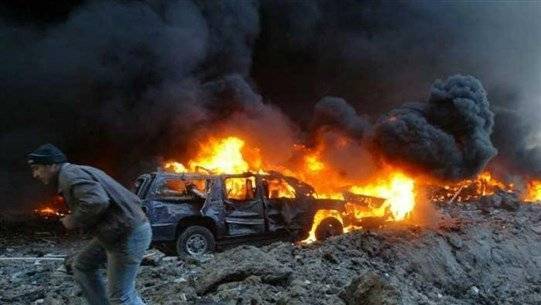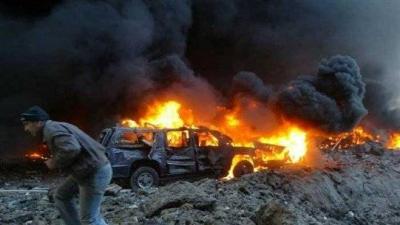They have been used to ending—or attempting to end—existing equations through assassination, whether by placing TNT somewhere, under a bridge, above a bridge, in a house, in a bag, in a church, or on the roadside, or by an explosion—using ammonium nitrate—that shakes a nation but does not disturb a conscience... to change equations and establish new ones... So are we heading towards new assassinations at this stage? And does the collective image of many deputies, from various blocs, on the 40th anniversary of the assassination of the President of the Republic, Sheikh Bashir Gemayel, worry some "resistors"? And is the general scene in 2022 the same as in 2007? Opposition and change-oriented deputies are speaking these days, in both private and public gatherings, about fears of renewed assassinations on the threshold of the upcoming elections for a new president of Lebanon, who is to be like the current state of stagnation, where a logic of bullying keeps Lebanon, the dream Lebanon, hostage, showing no signs of life.
Some deputies have received serious warnings in this context. Some have already started changing their lifestyles. One was advised to stop using his motorcycle entirely. Another was told to avoid certain roads and, if necessary, to sit in the back seat, on the right side rather than the left. A third was advised to move from his exposed home to a more neutral one. A fourth was told to reduce his movements... Are we entering a labyrinth that was drawn out since May 15, the day the parliamentary elections ended, and "Hezbollah" and its allies lost their majority in the Lebanese parliament?
From the very first day following the announcement of the election results, someone proclaimed, against the numbers, facts, and realities: we have the biggest bloc in parliament. The Free Patriotic Movement refused to acknowledge its decline. Since that time, preparations began for what could be "real changes." Challenges were but a trial. Assassinations, as occurred in 2007, according to Nadim Gemayel, will also be an attempt. The majority is in danger, and we have entered a tunnel. Back then, in 2007, they began hunting deputies like birds, one after another, with Pierre Gemayel, Antoine Ghanem, Walid Eido, and others being assassinated that day... At that time, the Venice Hotel turned into a fortress, or let’s say a stronghold, housing twenty Lebanese deputies representing the majority of that day. That once-still, closed hotel, secretly put up for sale, which once rolled out the red carpet for kings, princes, and presidents, became a stronghold for deputies at risk of being targeted. Windows were canceled, thick curtains blocked the inside from the outside, and deputies became prisoners of the hotel’s four walls. Will the scene repeat itself, with the difference that Venice "has given you its age"?
Today, some will say that anyone talking about assassination is creating a crisis. They are fishing in muddy waters, but past experiences and continuous security information necessitate caution. These are the forty-five hottest days. Will we be preoccupied with counting down: 45, 44, 43, 42...? Will they be able to elect a new president? Will fears of assassinations intensify if it becomes clear to a team that does not accept loss that Walid Jumblatt, through his nine deputies, will be among those who decide at the last moment what the "resistors" do not accept? Will a president unacceptable to the "bullying" team arrive with a majority of one?
Unjustified Fear
Let us ask Mustafa Allouch, the former deputy who also lived in the Venice suites in 2007: are the circumstances the same? Allouch sees that "the fear today is not justified as it is not based on specific data" and explains, "In 2007, the March 14 team had a clear majority capable of electing a president were it not for everything they practiced in obstruction, followed by the aggression of May 7, and at that time, the perpetrators of the assassinations were as clear as day, namely the 'Hezbollah' team, which acknowledged this in Doha and promised to stop it. However, now they are not obliged to repeat their previous approach, and therefore, I do not think deputies are at risk from the same team, but fear, of course, in such a fragile situation like ours, requires precaution."
However, what if the other team sees that the sovereign deputies agree on the need to elect a president from the camp they do not accept? Allouch responds, "Despite the rounds of meetings we see, they do not confirm that the sovereign deputies will form a unified opinion. Nothing is decided. And even if they determine the specifications for the president, they will not conclude on who they will nominate for the presidency. Meanwhile, 'Hezbollah' is 'digging the hole' for everyone and remains silent as usual, while the Speaker of the Parliament has clearly stated his rejection of Gebran Bassil's reaching the presidency. In any case, one cannot say that the matter is decided for any side. The change-oriented deputies, who are seen as the balance, will, I believe, not take a clear stance as they try to appeal to everyone."
Therefore, Dr. Allouch does not expect "Hezbollah" to adopt the same tactics it used in 2007, "for the circumstances are not the same, and Hezbollah's situation is not the same, so I do not think they will resort to that to change the equations in the presidential election."
Shall we feel reassured? Caution remains a duty.
But are there elements, or shall we say criteria, that precisely determine the level of danger or safety? Is there anything that makes the Lebanese, before their deputies, put their hands in cold waters?
It is undeniable that everyone is apprehensive about the upcoming phase, and about the complete failure of the security situation, as we face decisive days economically, politically, financially, and socially. The apprehension stems from assassinations rather than battles and skirmishes, as the war is waged between two armed factions and in the country there is one armed faction that decides what it sees fit. Sayyed Hassan Nasrallah has repeatedly stated: "Don't test us."
In any case, may we know how the security forces in the country capture the vibrations of anxiety regarding assassinations being planned? An expert in security matters and the protection of VIPs in Lebanon said, "No one is 100% safe," and explained, "Unexpected large potentials have now become influential, and thus we must always look outside the box. Do you imagine that a Christian Dior handbag can turn into a gun? Do you imagine that a credit card could be a knife?"
The expert's words are concerning. The question is, should we tell our deputies and political figures in Lebanon to pray the "Our Father and the Peace" or read Al-Fatiha to escape the clutches of evil?
The security expert classifies personalities into types: VVIP, VIP, and ordinary and parliamentary figures. He says: "There are intelligence agencies that determine who is more exposed to assassination than others," giving the example: "There are experiences drawn from the assassination of the martyr Rafik Hariri, and usually, at critical junctures, they are asked to take caution so that a similar scenario does not repeat itself. The leaders at risk are usually requested to reside in fortified locations and are provided with protection, and their movements are made professionally while defining the routes they can take and the places they are allowed to attend."
Being cautious is costly. Not all personalities can afford the same expenses, especially ordinary political figures who cannot provide what they need to stay safe. Thus, these people, until further notice, are considered easy targets. They cannot acquire multiple cars or live in different places. Antoine Ghanem was an easy target in 2007. Some monitored him. Some are always working to track personalities toward whom they harbor ill will, especially if they follow a particular routine: leaving at a specific time, arriving at parliament at a specific time, going to a nearby restaurant for lunch, moving in the same car. This indicates that protecting our deputies is difficult.
**Preventive Security**
What then? Security is the responsibility of the state—where there is a state—there, the state has information about the potential occurrence of an assassination and asks specific politicians—more exposed than others—to exercise caution and "take care of themselves." In any case, some agencies try to play their role and request that those at risk "contact them upon noticing any movement." This is known as preventive security. Usually, the security agencies use cross-referenced information, assembling it like a puzzle until the picture is complete. This information is usually distributed to targeted individuals. And those personalities must take their precautions and reduce their movements.
A VIP protection expert cites the moment of the assassination of Japanese Prime Minister Shinzo Abe as a valuable example, saying: "Abe's security team made tactical errors that led to his successful assassination; there are amateurs within that team as it turned out, and the protective shield bag was not opened due to a possible miscommunication or a malfunction, which is forbidden in VIP protection science." He adds: "The person designated as AIC—the one in service—also could not reach him and protect him despite the seconds passing between the first bullet fired and the second that hit him. Those seconds are what we call the golden opportunity in our work."
We may learn from others' experiences. However, what we cannot understand here is how all those who died in our country in assassination incidents remain unsolved. Only the bombing of the church was attempted to be linked to a party, and they issued a judgment on it. They were wrong. What remained has continued to be unknown or ignored.
So, are assassinations returning? Are we facing difficult days ahead? Let us hope that "they are remembered but do not return," and fears will remain a cause for caution only. Say a prayer.




